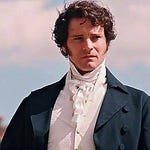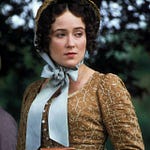Today I bring you two things: a conversation about a short piece of writing about London by Virginia Woolf, and a fascinating blow-by-blow account of a recent visit to the theatre.
‘Street Haunting: A London Adventure’
Today, I’m bringing you a conversation about a piece of writing by Virginia Woolf called ‘Street Haunting: A London Adventure.’ It’s a short piece of writing about a person leaving their home to ramble through the streets of London on a winter’s afternoon and it was chosen by my interlocutor today, Alia Parker, who writes a newsletter on Substack called Mind Flexing.
‘Street Haunting’ offers an enjoyable jaunt through London; Woolf describes leaving the house to buy a pencil:
No one perhaps has ever felt passionately towards a lead pencil. But there are circumstances in which it can become supremely desirable to possess one; moments when we are set upon having an object, an excuse for walking half across London between tea and dinner. As the foxhunter hunts in order to preserve the breed of foxes, and the golfer plays in order that open spaces may be preserved from the builders, so when the desire comes upon us to go street rambling the pencil does for a pretext, and getting up we say: “Really I must buy a pencil,” as if under cover of this excuse we could indulge safely in the greatest pleasure of town life in winter—rambling the streets of London.
Of course, because this is Woolf, there is a wider point to be made, or several points perhaps. Here we encounter an acute and sensitive depiction of leaving the house and returning — how it effects our brains to venture out with ‘houseless heads’ and with the staid and narrowing influence of our prejudices and personalities cast aside.
And we also encounter Woolf the writer, setting off into the city streets to bring back writing material, perhaps symbolised by the pencil. After the joy of rambling through the streets and bumping up against other people, the narrator remembers the purpose of her outing:
But we are come to the Strand now, and as we hesitate on the curb, a little rod about the length of one’s finger begins to lay its bar across the velocity and abundance of life. […] Ah, we remember, it was a pencil. Let us go then and buy this pencil.
After our chat, Alia commented in an email to me:
Upon reading Street Haunting ahead of our chat, my very first thought was about the pencil in the opening line and disagreeing with Woolf over her flippant remark that, "No one perhaps has ever felt passionately towards a lead pencil." My instinctive thought was that I'm sure a lot of artists have felt quite passionate about their lead pencils, as there are so many types of lead you can get in a pencil. She herself spends a great deal of time selecting one in the story. And I kept thinking about how a pencil was probably used more by artists rather than a writer with a pen or typewriter, but I couldn't find the form to that thought in my mind; I couldn't connect it to her London adventure.
The symbolism of the pencil was bugging me because I felt I couldn't adequately answer your question.
But after listening to Ronald's analysis of 'The Lady In The Looking Glass', and the idea of the frame and the ink, it suddenly occurred to me that the pencil was indeed for drawing. Just like an artist goes out and details moments in their sketchbook, Woolf was metaphorically drawing sketches of London to take back to her room to inspire her writing. I became more convinced of this after listening to your discussion with Nancy about the painting…
My chats with Ronald and Nancy are here and here, if you’re interested. And I hope you enjoy this one. It was a lot of fun — thanks Alia!

Musical theatre-going: A Sydney Adventure
I am recently back from a short solo trip to Sydney. I made the long drive north to see the multi-award winning Broadway musical, Hamilton, which is currently doing a second run in Sydney. I’m not much of a musical theatre fan — I am very high brow and intellectual, you see — but I allowed my arm to be twisted by some middlebrow, musical-loving associates.
Because I’m on a shoestring at the moment, I opted to stay at a hostel while in Sydney. Surely they will have some cheap private rooms available, I thought erroneously to myself. No. Only dormitories. There is nothing like staying in a four bed female-only dormitory in an inner city hostel to make all of one’s grey-haired, middle-aged proclivities gather themselves in a mound in the centre of oneself and begin sending up smoke signals.
When I checked in, the friendly young staff members behind the desk asked what had brought me to Sydney. They wore matching green and white checked shirts. ‘I’m here to see Hamilton,’ I said, sheepishly and defensively. This sheepish-defensive demeanor is how I confront young urban people when unsure of how my choices will be coded. I prepared to defend myself but needn’t have bothered. The friendly young staff members looked at me quizzically. Question marks hovered over their heads.
‘You know. Hamilton. The multi-award winning Broadway musical.’
I was met with sunny faces unclouded by knowledge of musicals, on or off Broadway. It felt unfair that I should be called upon to explain Hamilton to a bunch of hostel clerks when I am so high brow and have such good taste.
I changed tack. ‘Is the Lyric Theatre the one in the next street?’ I asked (mistakenly thinking of the Capitol Theatre).
‘Lyric Theatre…’ said one of the friendly young staff members slowly. ‘Let me google that. How do you spell Lyric?’
Unfortunately, the Lyric Theatre was not in the next street but in Pyrmont. Oh dear — that meant I was running late. I hurried to the lifts.
‘Enjoy your concert!’ one of the friendly young staff members called after me cheerily.
‘Thanks!’ I said, feeling the middle-aged fire within bank itself up and a few smoke signals escape. Then, haughtily, I boarded a lift thinking, idiots, only to return by the same lift moments later, having failed the very simple intelligence test of finding my room. ‘That number at the front of your room number is the floor number,’ a friendly young staff member explained slowly and clearly, addressing me as if I perhaps grew up before multi-storey buildings were invented.
‘No, I know that!’ I laughed. ‘But when I went up there…’ I gave a charming, self-deprecating rendition of where I’d got lost and received further instructions. (Turn right when you get out of the lift.) I re-entered the lift feeling considerably less haughty. Probably the friendly young staff members were thinking, idiot, as the doors closed on me. Fair enough.
The dormitory showed evidence of other inhabitants but was empty. I took ownership of a lower bunk, then changed from my sensible car clothes into clothes that I felt made me look marginally younger and less countrified. To this ensemble, I added a capacious many-pocketed handbag which added the years and dowdiness right back on. (Motherhood has taught me to always have about my person bandaids, tweezers, travel tissues, sunblock, drink bottle and a bag of scroggin.)
I took the lift back to the ground floor. There was another woman in the lift who spent the whole ride down standing perpendicular to the doors consulting her face in the reflective chrome walls and flicking her hair carefully. I wanted to explain that the universal law of elevators states that you must stand facing the doors — it’s part of the social contract, lady! — but I managed to stifle all that. You’re in the city now, I told myself. Get a grip. Be cool.
In the end, I had to run most of the way through Haymarket, across Darling Harbour, past the Maritime Museum, to Pyrmont — dodging tourists and texting that I was on my way.
I plunked down in the seat next to my friends just as the lights went down. They beamed at me while I returned a smile dampened by irritation and cynicism. I felt sweaty. Why put myself through this? Why was I even here? I don’t even like musicals! My mind held its rigid shape and refused to loosen into a more receptive frame. When the performers took the stage, the crowd went wild with cheering and screaming and applause. I subtly turned to look around at who these people were that would go wild at a Hamilton show. On the stage, the performers rapped about the American War of Independence. Well, this is silly, I thought.
Ten minutes later, I was completely engrossed.
During the intermission, my friends reviewed all the songs so far and the performers. Which performers were understudies. How they compared to the usual person. I’d begun to tire of being cynical so gave it up and allowed their enthusiasm to buoy me up, ready for the second half.
‘I forgot to bring tissues,’ one of my friends confessed as we took our seats. ‘But I have some toilet paper if you need it.’
I tried to understand what this could mean.
Seeing my confusion, she added, ‘I’m going to cry in the second half.’
‘Oh,’ I said. I laughed, helping myself to a quick handful of scroggin. ‘I’m sure I’ll be fine.’ Pffff, I thought. As if! I’m not going to…
Half an hour later, I was weeping. It was difficult to hold in the sobs and hiccups logjammed in my chest. In fact, I think I put my back out trying to restrain my spasming diaphragm — some sort of karmic payment for my earlier cynicism. Tears coursed down my cheeks. But you don’t even LIKE musicals, my brain wailed wetly at me. You’re so high brow! You read Camus!
After the show, I wandered down towards the orchestra pit to see a friend who is a musician in the ensemble — that was another reason I was there. We chatted for a bit, me leaning over the pit. Behind me, I assumed the audience was also chitchatting while idly making for the doors, but that was an incorrect assumption. People had departed with the same efficiency as practicing a fire drill and, when I looked around, the auditorium was empty except for a ring of ushers slowly closing in on me as if I were a lost kangaroo that had accidentally hopped into a shopping centre. Instinctively I put up my hands to convey my submissive law-abiding nature. A very stern usher told me I had to leave.
‘I have to leave,’ I told my friend in the orchestra pit. ‘Maybe I could meet you in the—’
‘You have to leave,’ said the usher again. No one was smiling. I’m innocent, I wanted to tell them. I’m carrying bandaids and scroggin for heaven’s sake! But I didn’t have time to protest my innocence because the ushers deployed a sort of pincer manoeuvre and I was guided out of one of the forward doors — exactly as you would guide a confused and skittish kangaroo back to where it belongs. So out I went, hopping to freedom. Though gingerly, because I’d put my back out from crying so hard.
And that’s my story of attending Hamilton. Fascinating stuff.
Until next time friends!






